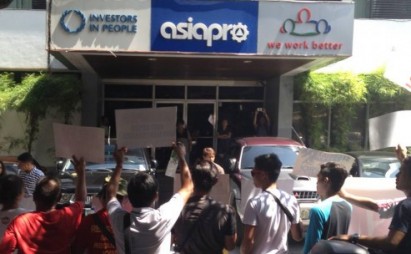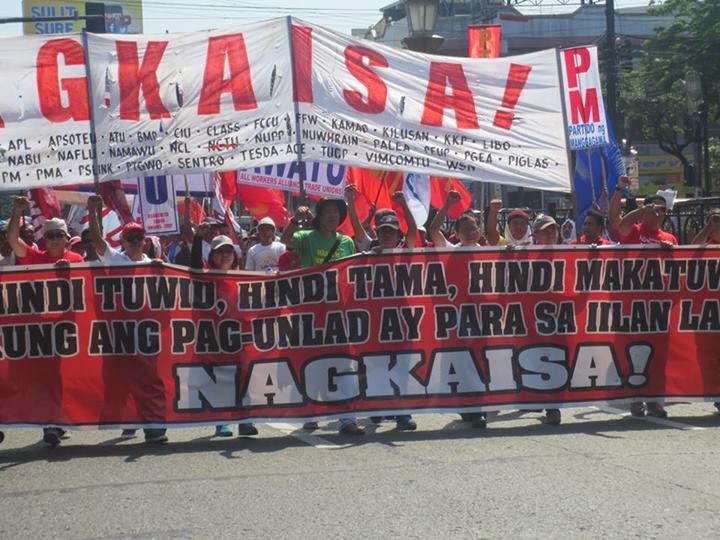Labor coalition Nagkaisa chided President Benigno Simeon Aquino III
for continuing to dishonor workers on Labor day by failing to respond
to important issues raised by labor representatives during the
non-ceremonial pre-labor day dialogue in Malacanang the other day.
"President Aquino continues to ignore for four years the issues which
we believe would help impact the plight of the working people. Workers
are feeling deprived of the benefits due them despite of their great
contribution to improving economy," the Nagkaisa said in a statement.
"Since assuming presidency in 2010, Mr. Aquino is always being
remembered by workers in every Labor day memorial as a leader who has
abandoned and failed them at the critical moment when they needed his
leadership in view of growing joblessness, rising cost of living,
rampant and unfettered precarious work arrangement, high cost of
electricity rate and by conceding social protection services to greedy
capitalists," they added.
"Hindi tuwid, hindi tama, hindi makatuwiran kung pag-unlad ay para sa
iilan lamang (it is not straight, it is not right, it is unjust if
growth is shared only by a few)," the group stressed as they plan to
muster 30,000 of their members march from Welcome Rotonda to Mendiola
in today's Labor day commemoration. The group will assemble along
Espana at around 8a.m.
Aside from chastising Aquino, labor groups belonging to Nagkaisa also
lambasted Energy (DOE) Secretary Jericho Petilla and (BIR) Bureau of
Internal Revenue Commissioner Kim Henares for failing to offer
government solutions to pressing long-standing workers' issues raised
by Nagkaisa (United) during the yearly Labor day dialogue with
President Benigno Simeon Aquino III held the other day.
The group also tagged the duo as "the weak link that help makes Aquino
appear out-of-touch, out-of-tune and widely disconnected with workers'
issues raised by Nagkaisa in the past four years."
"Out of the several cabinet secretaries who responded to the issues
that Nagkaisa raised, it was Ms. Henares and Mr. Petilla who appears
to be badly serving the president by refusing to offer solutions to
the high cost of electricity and tax issues as a way and means of
non-wage economic relief to workers in view of not benefitting from
despite of significant contribution to make the economy performed
excellently in the past years," the Nagkaisa said in a statement.
During the span of the two-year Nagkaisa dialogue with the executive
government, the alliance have demanded for Henares to provide tax
breaks to workers by way of taxing only the incremental amount of the
negotiated minimum wage of regular workers and expand the tax exempt
de minimis fringe benefits enjoyed by employees from their employers
as performance incentive.
"It is clear to us that Ms. Henares wants to meet her revenue quota by
making workers bleed in the sand, clearly ignoring the fact that these
workers are the backbone of the economy and were responsible for high
economic growth that she, the employers, and this administration are
flaunting about," the group said.
On the issue of the high cost of electricity, Nagkaisa have demanded
that to make the country attractive to investors that creates jobs a
Presidential Commission on Power must be created immediately.
"We proffered that the Commission to be made up of a national
multi-sectoral and multi-agency actors who will craft a 24-month
national strategy response that will craft a 24-month roadmap aimed at
lowering the cost and ensuring sufficiency of energy supply. That way,
a reduced electricity cost will make workers spend more on their food
and basic necessities at the same time invite foreign and local
investors put up more shops, offices and factories creating jobs for
the millions unemployed," the alliance said.
"However, it was clear to all that Mr. Petilla downgraded the proposal
to just create a task force under the auspices of the Department of
Energy (DOE) rather than a presidential commission is a signal that he
wants the Filipino people to be continued hostage by the monopsony of
a few powerful elites that controls the entire energy sector. Nagkaisa
condemns his arrogance and we will continue to hold him into account.
Nagkaisa will insist on the establishment of a commission."
On the issue of contractualization otherwise known as "555" or "endo",
a precarious scheme of employment arrangement, as the most important
issue that Nagkaisa raised in the dialogue, the group welcomed
Aquino's announcing his middle-ground response to this issue on May
28th.
Aside from eliminating contractualization scheme, lowering electricity
rates and providing tax breaks to workers, Nagkaisa welcomes the
response of Trade and industry Secretary Gregory Domingo, Justice
Secretary Leila De Lima, Yolanda Rehab and Reconstruction czar
Secretary Panfilo Lacson for acceding to Nagkaisa demand for labor
sector to be included in the crafting of a jobs-led agro-industrial
plan, monitoring and evaluation of the prosecution of extra-judicial
killings of union organizers and journalists, and inclusion of
Nagkaisa representatives in the formulation and implementation of
Yolanda-hit reconstruction and rehabilitation strategies.
Nagkaisa also welcomes the assurance of Aquino to immediately ratify
the ILO convention 151— a convention concerning protection of the
right to organize and procedures for determining conditions for
employment in government service.
The group also awaits Aquino's unequivocal policy statements in the
next dialogue on the issue of revision in the EPIRA law, providing
affordable in-city housing program, non-violent transfer of urban poor
communities in danger zones, appointment of a workers' sector
representative in the Energy Regulatory Commission (ERC), and approve
into law the Freedom of Information bill.
ABOUT NAGKAISA

Launched on April 2012, the Nagkaisa is the biggest alliance of labor
groups and workers organizations in modern history of trade union
movement in the country. It is composed by the Alliance of Free
Workers (AFW) , All Filipino Workers Confederation (AFWC), Automobile
Industry Workers Alliance (AIWA), Alab Katipunan, Association of
Genuine Labor Organizations (AGLO), Associated Labor Unions (ALU),
Associated Labor Unions- Association of Professional Supervisory
Officers Technical Employees Union (ALU-APSOTEU), ALU-Metal,
Associated Labor Unions-Philippine Seafarers'Union (ALU-PSU),
ALU-Textile, ALU-Transport, Associated Labor Unions-Visayas Mindanao
Confederation of Trade Unions (ALU-VIMCOMTU), Alliance of Progressive
Labor (APL), Association of Trade Unions (ATU), Bukluran ng
Manggagawang Pilipino (BMP), Confederation of Independent Unions
(CIU), Confederation of Labor and Allied Social Services (CLASS),
Construction Workers Solidarity (CWS), Federation of Coca-Cola Unions
(FCCU), Federation of Free Workers (FFW), Kapisanan ng Maralitang
Obrero (KAMAO), Katipunan, Pambansang Kilusan ng Paggawa (KILUSAN),
Kapisanan ng mga Kawani sa Koreo sa Pilipinas (KKKP), Labor education
and Research Network (LEARN), League of Independent Bank
Organizations (LIBO), Manggagawa para sa Kalayaan ng Bayan
(MAKABAYAN), MARINO, National Association of Broadcast Unions (NABU),
National Federation of Labor Unions (NAFLU), National Mines and Allied
Workers Union (NAMAWU), National Association of Trade Unions (NATU),
National Confederation of Labor (NCL), National Confederation of
Transport Union (NCTU), National Union of Portworkers in the
Philippines (NUPP), National Union of Workers in Hotel, Restaurant and
Allied Industries (NUWHRAIN), Philippine Airlines Employees
Association (PALEA), Pepsi Cola Employees Union of the Philippines
(PEUP), Philippine Government Employees Association (PGEA),
Pinag-isang Tinig at Lakas ng Anakpawis (PIGLAS), Philippine
Integrated Industries Labor Union (PILLU), Philippine Independent
Public Sector Employees Association (PIPSEA), Partido Manggagawa (PM),
Philippine Metalworkers Alliance (PMA), Public Services Labor
Independent Confederation (PSLINK), Philippine Transport and General
Workers Organization (PTGWO), SALIGAN, Trade Union Congress of the
Philippines (TUCP), Workers Solidarity Network (WSN).








